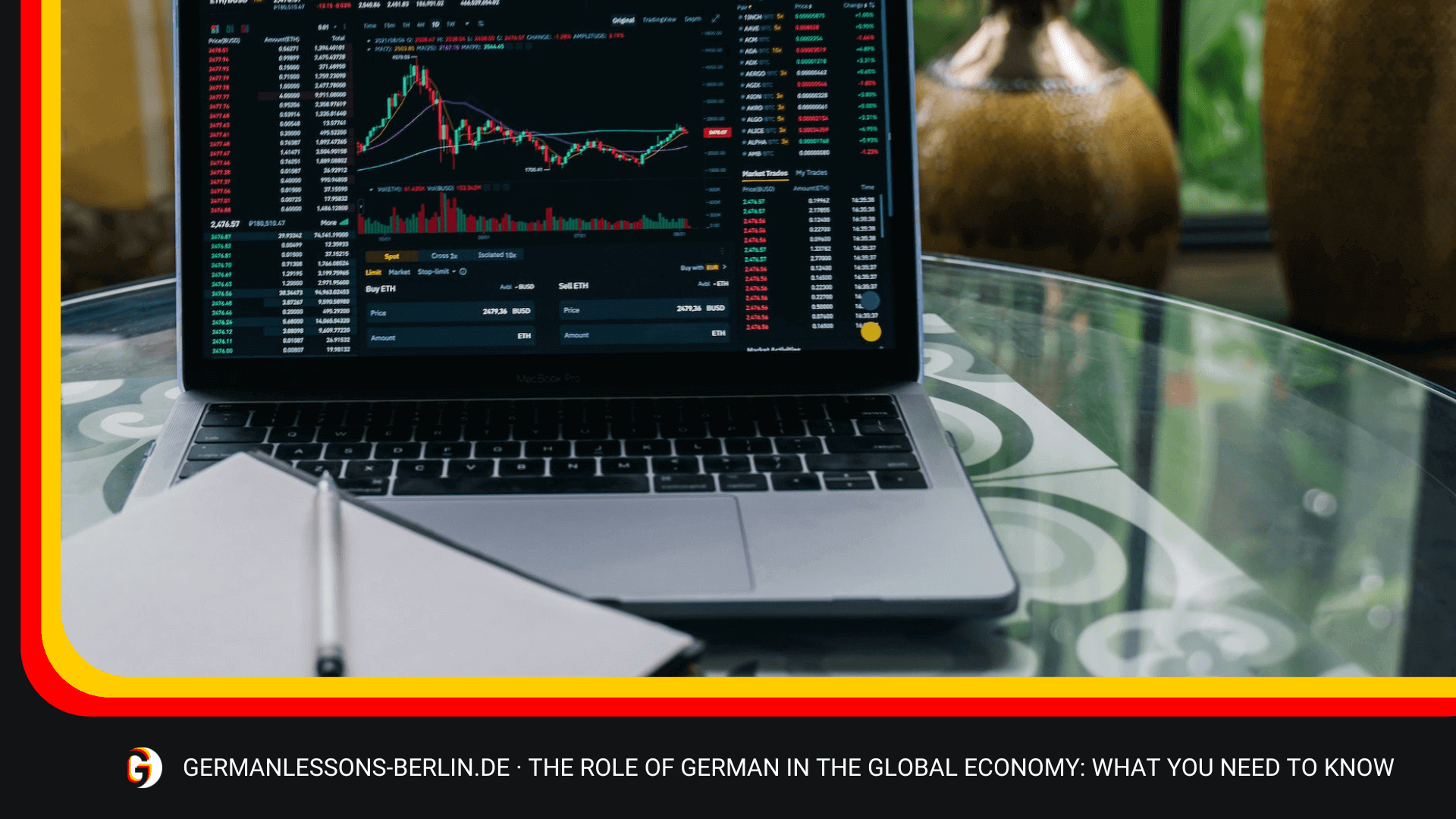The world of economics is a complex and ever-shifting landscape. It’s no surprise that the role of Germany in the global economy has become increasingly important over recent years. This article takes a closer look at what you need to know about German’s influence on the worldwide economy.
Germany, with its strong export and manufacturing industry, is one of Europe’s largest economies – but it doesn’t stop there. Its impact stretches far beyond European borders and can be felt across all continents as an integral part of today’s global market system. From automotive giants to companies dedicated to energy production, Germany plays a vital role in keeping the wheels of international trade turning.
But how exactly does Germany fit into the wider picture? What are some practical implications for businesses operating within this framework? And which sectors benefit most from these changes? Read on for answers to these questions and more!
Table of Contents
Definition Of German
German is a West Germanic language spoken mainly in Germany, Austria, Switzerland, Liechtenstein, Belgium and Luxembourg. It’s the most widely spoken native language in the European Union and one of the 24 official languages of the EU. The origins of German can be traced back to Proto-Germanic, an extinct Indo-European language from which modern English also derives its roots. Throughout history, many dialects have developed as well: High German (spoken in southern Germany), Low German (spoken in northern parts) and Central German (used for writing).
The etymology of the word “German” comes from the Latin term “germanus”, meaning “brother”. This term was used by Julius Caesar when referring to tribes living east of River Rhine that he encountered during his campaigns. Over time, this terminology spread throughout Europe and became associated with all speakers of West Germanic Languages.
The use of German has been critical in shaping global economy today. Many international companies rely on it to conduct business transactions while governments utilize it to form treaties between nations. Moreover, it serves as a bridge connecting cultures by allowing people to communicate across linguistic barriers through translation services or bilingual education programs. As such, understanding how German functions within the larger economic context is key towards developing sustainable strategies for any organization operating at an international level.
History Of German Economy
The German economy has a long and complex history. In the 19th century, it underwent substantial growth as an industrial powerhouse with an emphasis on trade and manufacturing. This led to rapid economic development in Germany that lasted until World War I, when the country was forced into a period of stagnation due to post-war reparations. However, after WWII, Germany experienced tremendous economic recovery and growth, becoming one of Europe’s strongest economies by the end of 20th century.
Today, Germany is known for its strong export market and high levels of productivity. It accounts for around 28% of global exports and is home to some of the world’s biggest companies like Volkswagen AG and Daimler AG. As such, it plays an important role in both European and global economic stability. The german_economic_story has been largely positive over recent decades; between 2000 and 2018, GDP per capita grew by 24%, while unemployment fell from 11% to 4%.
This impressive german_economic_growth can be attributed to various government policies designed to stimulate investment, encourage innovation, expand international trade opportunities and reduce labor costs – all crucial components of economic development_germany. With these factors in place together with sound fiscal management practices, it’s easy to see why Germany remains today one of the leading nations within the global economy.
Overview Of Current Economic Situation
The global economic situation has been in flux due to the coronavirus pandemic, but Germany remains an economic powerhouse. Here’s what we need to know about the current overview of Germany’s role in the global economy:
- The German economy is one of Europe’s most powerful, with a GDP of around $3.9 trillion USD in 2019.
- In terms of exports, Germany was ranked fourth globally in 2020, exporting goods worth over $1.6 trillion USD that year alone.
- Despite being hit by COVID-19 restrictions and shutdowns like many other countries, the country managed to grow slightly between January and March 2021 compared to last year’s figures – something not seen across much of Western Europe during this time period.
- The German government recently committed itself to spending billions on renewable energy projects as part of its Green Deal policy aimed at reducing emissions and improving air quality throughout the nation.
It’s clear from these facts that Germany continues to play an important role within the European and global economies despite recent setbacks caused by the virus crisis. Its commitment to environmental sustainability also signals a positive outlook for future growth potential both internally and abroad – especially when combined with its strong export capabilities and robust manufacturing base!
Impact On European Union
The impact of Germany on the European Union (EU) has been immense. Its strong economy and high standards for industry, labour and trade have helped to keep Europe competitive in global markets. German exports make up a significant portion of EU imports, while its growth rate is one of the highest among all member countries.
German-EU trade was at an all-time high in 2020, with almost €1 trillion worth of goods exchanged between them. It also contributed significantly to the overall economic health of the union; German exports accounted for more than 20% of total EU exports over that period. Additionally, many companies based in Germany are increasingly investing outside their borders, providing valuable resources and jobs to other parts of the continent.
Germany’s importance within the EU goes beyond just economics; it holds considerable influence within political circles as well. The country often acts as a mediator when disagreements arise between members or sets precedents through initiatives such as reducing emissions or implementing stricter regulations on tech giants like Amazon and Google. Through these efforts, Germany continues to demonstrate its leadership role both economically and politically within the EU.
Overall, Germany’s role in shaping the future of the European Union cannot be understated: from driving economic growth to setting ethical standards for business operations across Europe, it remains an indispensable part of the framework that holds together this diverse union.
Major Industries In Germany
Germany is a major contributor to the global economy, and its industries play an important role. The country has several key sectors that are responsible for driving their economic growth. These include German automotive, banking, retail, pharmaceuticals, and energy sectors.
The most influential industry in Germany is undoubtedly the automobile sector. This includes brands such as Audi, BMW, and Mercedes-Benz which remain popular around the world due to their quality engineering and design. German cars have been exported to countries all over the globe since the 1960s and continue to be a source of significant revenue for the nation’s economy.
German banking also plays an integral role in the country’s financial system with various banks offering products such as insurance policies and loan services. Banks like Deutsche Bank provide much needed liquidity within Germany’s capital markets by providing credit lines to businesses. Additionally, they offer investment opportunities both domestically and abroad through their extensive international presence.
Lastly, other industries including retail, pharmaceuticals and energy contribute significantly to Germany’s GDP each year thanks to their innovative approaches towards production processes and customer service provisioning. As one of Europe’s largest economies it is no surprise that these sectors are essential components of Germany’s success on a global scale.
In short, Germany has established itself as a powerhouse of commerce throughout the world due to its strong industrial base spanning multiple sectors from automobiles to pharmaceutics. Through efficient management practices combined with technological advancements they have managed to maintain their reputation as one of Europe’s leading nations when it comes to economic stability and sustainability.
Role In World Trade
Germany plays an integral role in the global economy as one of the world’s largest exporters. German exports account for around 13% of global merchandise trade, making it the third-largest trading nation worldwide. Germany is also a major foreign investor and has invested heavily in other countries like France, China, and Brazil. This international trade helps to create jobs throughout Europe and further strengthens Germany’s position within the global economy.
German businesses are particularly successful when it comes to exporting high-value goods including cars, machinery, chemicals, pharmaceuticals, electrical equipment and metal products. These exports have been key drivers of economic growth over recent years and continue to fuel innovation across many different sectors. Additionally, Germany benefits from low production costs due to its highly skilled workforce which contributes significantly to its competitive advantage on the international stage.
The country’s significant presence in world markets means that it can take full advantage of opportunities presented by globalization – such as increased access to new technologies or materials – while at the same time protecting its own domestic interests through various bilateral agreements with its partners. This ensures that German companies remain competitive while still maintaining their core values of sustainability and ethics in their business practices. As a result, Germany continues to be a strong contributor to the overall stability of the global economy.
Opportunities For Businesses
The German economy provides many opportunities for businesses looking to invest, expand or enter the export market. For those wanting to take advantage of access to the vast German market, Germany offers an attractive environment with its well-established infrastructure and business regulations. For foreign companies looking to do business in Germany, there are numerous tax incentives available that can make doing business more profitable than other countries. Additionally, the country’s strong commitment to research and development makes it a great place for innovative startups and established enterprises alike.
With a population of over 83 million people and one of Europe’s largest economies, Germany has become an attractive target for business investment. The government actively encourages foreign direct investment by offering special benefits such as tax exemptions, capital grants and venture capital financing options. Furthermore, thanks to its central location within Europe combined with modern transportation systems like Autobahns and airports, businesses have easy access to both domestic markets as well as regional ones across Europe.
German exports are renowned around the world for their quality and reliability which makes them highly sought after by global buyers. In addition to having excellent trade agreements with most EU member states, Germany is also part of several international trade blocs which provide further access into lucrative overseas markets. With all these advantages in mind, it’s no wonder why so many businesses choose Germany when considering their next international expansion opportunity.
Educational Requirements
German educational requirements are some of the most stringent in the world. To be eligible for higher education or vocational training, a student must first meet certain prerequisites set by the German government. Those qualifications include proficiency in the German language as well as academic and aptitude tests to assess suitability for particular fields.
In order to demonstrate mastery of the German language, applicants must provide proof of their ability through a standardized test such as TestDaF (Test Deutsch als Fremdsprache). Depending on the institution, other linguistic assessments may also be accepted, such as Telc (The European Language Certificates) or Goethe-Zertifikat exams. Academic qualifications generally require students to have completed high school or equivalent studies in Germany prior to applying for university or vocational training programs. Furthermore, many colleges and universities may ask candidates to submit results from scholastic aptitude tests like Abitur or DSH (Deutsche Sprachprüfung für den Hochschulzugang).
Vocational training opportunities are offered at both technical schools and various trade academies across Germany. Students who wish to pursue these paths will need to pass entrance examinations that measure their skills and knowledge relevant to the field they plan to study. In addition, successful completion of secondary schooling is often required before enrolling in any apprenticeship program.
For those wishing to work professionally in Germany, meeting all necessary educational requirements is essential. Not only does it demonstrate an individual’s commitment and dedication but can also open doors that would otherwise remain closed due to lack of proper preparation. It goes without saying: investing time and effort into one’s education pays off significantly in the long run!
Cultural Implications
Moving on from the educational requirements of German in a global economy, the cultural implications must also be considered. This language is more than just an economic tool; it has significant cultural significance to many countries throughout Europe and beyond. As such, learning the language can open up social networks and opportunities that may have otherwise been unavailable.
Having knowledge of German culture can provide insight into how certain aspects of business are conducted around the world. For example, understanding Germany’s historical background allows one to comprehend why their approach to economics differs so greatly from other nations. Additionally, being able to understand German customs and etiquette could prove invaluable when working with multinational corporations based out of this country. Furthermore, having exposure to various cultures via communication with native speakers provides individuals with insights they would not normally have access to if only English was spoken.
Being aware of these cultural implications will help businesses make informed decisions while operating within a global market place. Additionally, knowing multiple languages opens new paths for career growth as well as giving people a better appreciation for different cultures across the globe. Having an understanding of the social and economic implications that come along with speaking German gives professionals an edge in today’s competitive international environment.
Future Outlook
German economic growth is expected to remain strong in the near future. Current trends suggest that global markets are increasingly relying on German industry and investment, which has been a major driver of Europe’s economic recovery. This trend will likely continue as Germany continues to be an attractive market for businesses from around the world.
As such, foreign direct investment (FDI) into Germany remains robust despite weaker than expected Eurozone data. This suggests that investors still see potential opportunities within the country’s economy due to its openness and diversity, particularly in terms of technology-related industries. As such, many large companies have already heavily invested in Germany and are continuing to do so.
Overall, it appears that German business activity is well positioned to remain competitive globally in the years ahead. With ongoing investments by both domestic and international firms, the outlook for this important European nation looks bright. Therefore, those interested in following global economic trends should keep a close eye on Germany’s progress over time.
Frequently Asked Questions
How Does The German Economy Compare To Other Economies Around The World?
When it comes to the global economy, Germany is an important player. The German economy ranks as one of the largest in Europe and has a major influence on international business. To understand how the German economy compares to other economies around the world, it’s helpful to look at economic trends across different countries.
Germany maintains a strong presence when it comes to both domestic and international business. It boasts some of the most successful companies in the world including BMW, Daimler AG, Siemens, Volkswagen Group and Bayer AG. This contributes significantly to their robust economy which stands among the top 5 economies globally with exports totaling over €1 trillion annually.
The success of the German economy can be attributed to its highly educated workforce, competitive labor costs and its commitment to innovation through research and development spending. It’s also benefited from having access to key European markets such as France and Italy as well as being part of an integrated trade network that includes Asia-Pacific countries like China and Japan. These factors have made Germany an attractive destination for foreign direct investment (FDI) inflows which have contributed to its growth over recent years despite challenges posed by Brexit uncertainties or U.S.-China trade tensions.
Given these advantages combined with its strategic location within Europe, it’s clear why Germany plays such an influential role in today’s global economy–establishing itself as one of the leading players in terms of both current performance and future potential.
What Are The Benefits Of Doing Business In Germany?
When it comes to doing business, Germany offers a lot of advantages. From its robust business environment and infrastructure to its highly skilled workforce and market access opportunities, there are plenty of reasons why companies choose to invest in the German economy.
For starters, the German government provides an attractive business environment that is conducive for foreign investment. Businesses can benefit from well-developed laws and regulations as well as reliable legal protection when conducting operations in Germany. Additionally, the country has excellent transportation networks which make it easy to transport goods or services across borders. Moreover, there is plenty of advanced technology available within the nation’s industrial sectors so businesses can stay ahead of the competition no matter what sector they operate in.
The German labor force also sets itself apart from other countries. Employees have ample education levels and technical expertise due to strict educational requirements put in place by the government. This means companies don’t need to spend time training employees on basic skills – instead they can focus their attention on higher value tasks such as research & development or marketing strategies. Furthermore, with access to European markets through free trade agreements between EU members, businesses can easily export products into new territories without having to worry about costly tariffs or regulatory hurdles.
Overall, Germany presents a compelling proposition for those looking to do business abroad; it may be one of Europe’s smaller economies but its competitive edge lies in its strong fundamentals and open attitude towards foreign investments – making it an ideal destination for entrepreneurs around the world.
Are There Any Specific Challenges Associated With Conducting Business In Germany?
When it comes to conducting business in Germany, there are some specific challenges that must be considered. The German economy is complex and ever-changing with shifting economic trends, making it difficult for companies to stay ahead of the game. Additionally, cultural considerations come into play when doing business in this country due to its unique culture and language.
It’s important to have a good understanding of the current state of the german economy before attempting any kind of venture in the country. Companies should also familiarise themselves with local laws and regulations as they may vary from those found elsewhere around Europe or even globally. In addition, businesses should take note of any taxes or fees associated with operating within the region.
Finally, navigating different cultures can often present an obstacle for international companies looking to conduct business in Germany. Cultural differences such as language barriers, customs and norms can all affect how successful their operations will be – especially if not taken into account during planning stages. It would therefore benefit any company considering investing in Germany to research these issues thoroughly beforehand so that potential problems can be avoided.
What Are The Current Trends Impacting The German Economy?
What are the Current Trends Impacting the German Economy? is an important question to consider when discussing Germany’s role in the global economy. The trends and dynamics of its business environment can have a major impact on economic growth, providing many opportunities for foreign businesses looking to expand their operations into this powerful European country. In order to gain a better understanding of what these trends mean for conducting business in Germany, let’s look at some key points.
German economy trends such as inflation rate, government policies, consumer confidence and unemployment levels all play a part in determining the overall performance of the German market. Understanding how these factors interact with one another can give us valuable insight into what type of business opportunities may be available within Germany’s borders. Furthermore, it is important to take note of the changing political landscape; especially since recent elections saw dramatic shifts in power that could have far-reaching implications for companies operating there.
When considering Germany’s place in the global economy, it is also necessary to evaluate its potential impact on other countries around the world. For example, due to its strong manufacturing base and advanced technological capabilities, it has become increasingly attractive as an export nation – particularly for goods like automobiles. Additionally, its large financial services industry makes it a popular destination for international investments which can stimulate economic activity beyond just Germany itself.
Economic Growth Germany: Government Policies, Consumer Confidence, Unemployment Levels
Business Environment: Political Landscape Changes, Export Nation Attractiveness, Financial Services Investment Opportunities
Global Economy Impact: Manufacturing Base Strengths, Technological Capabilities Advantages, International Investments Stimulation
These insights illuminate both challenges and possibilities present in doing business in Germany today. Companies should keep up on developments within each of these categories so that they remain well informed about where their own interests lie before making any decisions related to investing or expanding operations in this dynamic marketplace.
Are There Any Particular Cultural Considerations To Keep In Mind When Doing Business In Germany?
When doing business in Germany, there are certain cultural considerations to keep in mind. These must be taken into account if businesses want to succeed in the German economy and contribute to the global economy overall. It is important for those involved with international trade to understand how culture affects economic activity, both domestically and abroad.
The German culture has had a tremendous impact on their economy over time. From quality craftsmanship to efficiency-focused production processes, Germans have always been known for their strong work ethic and commitment to excellence. This makes them ideal partners when it comes to conducting business in Germany or anywhere else around the world. Additionally, understanding some of the nuances of operating in a foreign country can make all the difference between success and failure when engaging in commerce overseas.
For example, punctuality is highly valued by Germans; this means that meetings should start promptly on time and any delays should be avoided at all costs. Furthermore, interpersonal relationships are held in high regard; making sure you treat people with respect while still maintaining professionalism is key when dealing with anyone from Germany or elsewhere during negotiations or other interactions. Finally, communication styles differ significantly between cultures; being aware of these differences is essential for successful collaboration across borders.
Considering these aspects before getting involved with international business ventures can greatly increase your chances of success as well as help ensure smooth operations throughout each transaction process. Understanding cultural considerations will not only benefit those looking to do business in Germany but also individuals who wish to take part in various activities related to the global economy.
Conclusion
In conclusion, it’s clear that the German economy plays a major role in the global economy. Businesses from all over the world can benefit by investing and conducting business in Germany for its strong economic performance, advanced infrastructure and skilled workforce. However, there are some challenges to be aware of such as navigating cultural differences and regulations which may differ from other countries. It’s also important to keep an eye on current trends impacting the German economy – like Brexit or digital transformation – so you can make informed decisions about your investments. All in all, with proper research and preparation doing business in Germany can help you get ahead in today’s competitive market.








